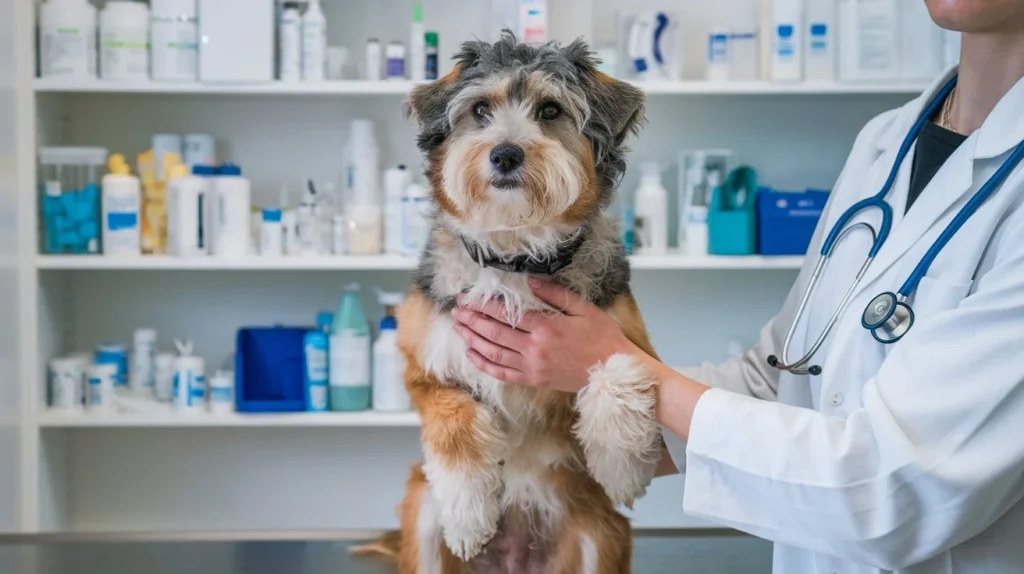Dr. Oz, the renowned health expert, has turned his attention to our furry friends, offering invaluable insights on dog care. In this comprehensive guide, we’ll explore Dr. Oz’s expert advice on dogs, covering everything from nutrition and exercise to preventive care and common health issues. Whether you’re a new pet parent or a seasoned dog owner, Dr. Oz’s recommendations can undoubtedly help ensure your canine companion leads a happy, healthy life. So, let’s dive into the world of Dr. Oz dogs and discover how to give our four-legged friends the best care possible.

Dr. Oz’s Top Tips for Healthy Dogs: Nurturing Your Canine Companion
When it comes to caring for our beloved pets, Dr. Oz dogs’ advice is second to none. His expertise extends beyond human health, and he’s passionately committed to promoting wellness for our canine friends. Therefore, let’s explore some of Dr. Oz’s key recommendations for keeping your dog in tip-top shape.
Nutrition: The Foundation of Canine Health According to Dr. Oz
First and foremost, Dr. Oz emphasizes the importance of a balanced diet for dogs. Just as with humans, proper nutrition is undoubtedly the cornerstone of good health for our canine companions. Consequently, here are some of Dr. Oz’s guidelines for feeding your dog:
- Choose high-quality dog food: Look for brands that list meat as the first ingredient and avoid those with excessive fillers or artificial preservatives. In fact, Dr. Oz dogs’ nutrition advice often stresses the importance of reading labels carefully.
- Consider your dog’s life stage: Puppies, adults, and senior dogs have different nutritional needs. Therefore, select food appropriate for your dog’s age and consult with your veterinarian for personalized recommendations.
- Watch portion sizes: Overfeeding can lead to obesity, which Dr. Oz warns can shorten a dog’s lifespan. As a result, use measuring cups and follow feeding guidelines based on your dog’s ideal weight.
- Incorporate fresh foods: Dr. Oz suggests adding some fresh fruits and vegetables to your dog’s diet, but always research which ones are safe for canine consumption. For instance, some dog-friendly options include carrots, blueberries, and green beans.
- Stay hydrated: Keep your dog well-hydrated by providing constant access to fresh and clean water. Indeed, Dr. Oz dogs’ health tips often include reminders about the importance of proper hydration.
Exercise: Keeping Dogs Fit and Happy with Dr. Oz’s Recommendations
In addition to proper nutrition, Dr. Oz is a strong advocate for regular exercise, not just for humans but for dogs as well. He firmly believes that physical activity is crucial for maintaining a dog’s physical and mental health. Therefore, here’s what Dr. Oz recommends for keeping your furry friend active:
- Daily walks: Aim for at least 30 minutes of walking per day, adjusting the intensity based on your dog’s breed and fitness level. In fact, Dr. Oz dogs’ exercise advice often emphasizes the importance of consistency.
- Playtime: Engage your dog in interactive games like fetch or tug-of-war to provide mental stimulation along with physical exercise. Consequently, this not only keeps them fit but also strengthens your bond.
- Swimming: For dogs that enjoy water, swimming is an excellent low-impact exercise that’s easy on the joints. Moreover, it’s especially beneficial for older dogs or those with arthritis.
- Agility training: Dr. Oz suggests that agility courses can be a fun way to challenge your dog both physically and mentally. This can be done at home with simple obstacles or at specialized dog training facilities.
- Indoor activities: On days when outdoor exercise isn’t possible, Dr. Oz recommends indoor games like hide-and-seek or puzzle toys to keep your dog active and engaged.
Dr. Oz’s Approach to Preventive Care for Dogs: Staying Ahead of Health Issues
Prevention is better than cure, and this philosophy is central to Dr. Oz’s advice on dog care. He strongly stresses the importance of regular check-ups and preventive measures to keep dogs healthy and catch any potential issues early. Therefore, let’s delve into Dr. Oz’s preventive care strategies for dogs.
Veterinary Check-ups: A Key to Longevity in Dr. Oz Dogs’ Health Plan
First and foremost, Dr. Oz recommends regular veterinary visits, even when your dog seems healthy. These check-ups can help detect problems before they become serious. Consequently, here’s what Dr. Oz suggests for maintaining your dog’s health through veterinary care:
- Annual exams: Regular veterinary visits are essential: Arrange annual check-ups for adult dogs, while puppies and senior dogs should see the vet more often. These visits should include a thorough physical examination and any necessary vaccinations.
- Vaccinations: Keep your dog up-to-date on all necessary vaccinations to prevent common diseases. Furthermore, your veterinarian can provide a customized vaccination schedule based on your dog’s age, lifestyle, and risk factors.
- Dental care: Regular dental check-ups and cleanings can prevent gum disease and other oral health issues. In fact, Dr. Oz dogs’ dental health advice often includes recommendations for at-home teeth cleaning as well.
- Parasite prevention: Dr. Oz highlights the necessity of protecting your dog from fleas, ticks, and heartworms. It’s important to speak with your veterinarian to determine the best preventive treatments for your pet.
- Spaying/neutering: Dr. Oz recommends spaying or neutering your dog not only for population control but also for potential health benefits, including reduced risk of certain cancers.
Mental Health: An Often Overlooked Aspect of Dog Care in Dr. Oz’s Holistic Approach
In addition to physical health, Dr. Oz recognizes that a dog’s mental health is just as important as their physical well-being. As a result, he offers these tips for keeping your dog mentally stimulated and emotionally balanced:
- Socialization: Expose your dog to different people, animals, and environments from an early age. This helps prevent fear and anxiety issues later in life.
- Puzzle toys: Provide toys that challenge your dog’s problem-solving skills. Consequently, this mental stimulation can help prevent boredom and destructive behaviors.
- Training: Regular training sessions keep your dog’s mind sharp and strengthen your bond. Indeed, Dr. Oz dogs’ training advice often includes positive reinforcement techniques.
- Attention and affection: Spend quality time with your dog every day, offering love and attention. This helps maintain a strong emotional connection and can reduce stress and anxiety in dogs.
- Routine: Create a reliable daily schedule for meals, walks, and playtime. Dogs benefit from a sense of predictability, and having a stable routine can alleviate anxiety.
Dr. Oz’s Insights on Common Dog Health Issues: Identifying and tackling health issues effectively
As Dr. Oz is in the medical line, it provides him with insightful information regarding various health issues related to dogs. He stresses the importance for dog owners to stay vigilant in recognizing potential health problems in their pets and take steps to address them. Thus, let’s discuss some of the very common health issues pertaining to dogs and how Dr. Oz deals with these.
Obesity: A Growing Problem in Dogs and Dr. Oz’s Solutions
First, Dr. Oz notes that obesity has become increasingly prevalent in dogs, which can result in various health complications. He recommends the following advice to maintain your dog’s healthy weight:
- Measure food portions: Utilize a measuring cup to accurately gauge food portions and prevent overfeeding. In fact, Dr. Oz dogs’ weight management advice often starts with portion control.
- Limit treats: Treats should make up no more than 10% of your dog’s daily calorie intake. Therefore, choose healthy, low-calorie options when possible.
- Encourage exercise: Increase your dog’s physical activity gradually if they’re overweight. Start with short walks and slowly build up duration and intensity.
- Regular weigh-ins: Monitor your dog’s weight regularly and consult your vet if you notice significant changes. Your vet can help you determine your dog’s ideal weight and create a weight loss plan if needed.
- Select the appropriate food: Choose premium, nutritionally balanced dog food that suits your dog’s age and activity level. Some dogs may benefit from weight management formulas.
Allergies: Identifying and Managing Canine Allergies with Dr. Oz’s Guidance
In addition to obesity, Dr. Oz notes that dogs, like humans, can suffer from allergies. Consequently, he provides guidance on identifying and managing allergic reactions in dogs:
- Watch for symptoms: Excessive scratching, red or inflamed skin, ear infections, and digestive issues can be signs of allergies. Indeed, Dr. Oz dogs’ allergy advice emphasizes the importance of early detection.
- Identify triggers: Work with your vet to determine what’s causing the allergic reaction. Common allergens include certain foods, environmental factors like pollen or dust, and flea bites.
- Dietary changes: In cases of food allergies, your vet may recommend an elimination diet to identify problem ingredients. For certain dogs, hypoallergenic dog foods might be suggested.
- Medication: In some cases, antihistamines or other medications may be necessary to manage symptoms. Always seek advice from your veterinarian before administering any medication to your dog.
- Environmental management: For environmental allergies, Dr. Oz recommends regular bathing to remove allergens from your dog’s coat, using air purifiers, and keeping your home clean to reduce allergen exposure.
Dr. Oz’s Tips for Dog Grooming: Maintaining Your Pet’s Coat and Skin Health
Proper grooming, Dr. Oz emphasizes that grooming is an important aspect of dog care. Not only does it deal with looking good but also it has something to do with the dog’s health. Here are some grooming suggestions from Dr. Oz:
- Regular brushing: This helps remove dead hair, distribute natural oils, and check for any skin issues. The frequency of brushing depends on your dog’s coat type.
- Bathing: The frequency of bathing your dog should be based on their breed and lifestyle. Excessive bathing can lead to dry skin, so it’s best to adhere to your veterinarian’s advice.
- Nail trimming: Keep your dog’s nails trimmed to prevent discomfort and potential injuries. If you’re unsure about grooming your dog on your own, think about opting for professional grooming services.
- Ear cleaning: Regular ear cleaning can prevent infections, especially in dogs with floppy ears. Utilize an ear cleaner recommended by your veterinarian, and be gentle to prevent any injury.
- Dental care: Brush your dog’s teeth regularly with dog-specific toothpaste. In fact, Dr. Oz dogs’ dental health advice often includes recommendations for dental chews and regular professional cleanings.

Dr. Oz’s Advice on Choosing and Caring for a New Dog: Making Informed Decisions
If you’re considering adding a furry friend to your family, Dr. Oz offers important guidance to help you make informed decisions and ensure your pet receives the best care right from the start:
- Research breeds: Various dog breeds possess unique requirements and temperaments. Therefore, Dr. Oz recommends thoroughly researching breeds to find one that fits your lifestyle and living situation.
- Consider adoption: Dr. Oz passionately supports the adoption of rescue dogs. Many shelters have purebred and mixed-breed dogs looking for loving homes.
- Prepare your home: Before bringing a new dog home, ensure your living space is safe and dog-friendly. This includes removing potential hazards and purchasing necessary supplies.
- Start training early: Begin basic obedience training as soon as you bring your new dog home. Consistent, positive reinforcement is key to raising a well-behaved pet.
- Schedule a vet visit: Take your new dog to the vet for a complete check-up within the first few days of bringing them home. This establishes a baseline for their health and allows you to discuss any concerns with your vet.
Understanding Your Dog’s Behavior: Dr. Oz’s Insights into Canine Psychology
Dr. Oz emphasizes the importance of understanding your dog’s behavior to maintain a harmonious relationship. As a result, here are some of his observations on dog psychology:
- Body language: Learn to read your dog’s body language. This can help you understand their emotions and needs better.
- Positive reinforcement: Use positive reinforcement techniques to encourage good behavior. This enhances your connection and increases the effectiveness of training.
- Consistency: Be consistent in your commands and expectations. This helps your dog understand what’s expected of them.
- Respect their space: Dogs, like humans, sometimes need alone time. Provide a safe, comfortable space where your dog can retreat when they need to.
- Address behavioral issues promptly: If you notice any concerning behaviors, address them quickly with the help of a professional dog trainer or behaviorist if necessary.
Conclusion: Embracing Dr. Oz’s Holistic Approach to Dog Care
Dr. Oz’s suggestions center on a holistic approach to the care of dogs-from nutrition and exercise, to mental health and preventive care. By following these guidelines, you will be able to help your furry friend lead a healthy, happy, long life.
Just like each person, every dog is an individual, and what works for one may not work for another. So, if you want to make any major changes in your dog’s diet or routine, always consult with your veterinarian first. With expert advice from Dr. Oz, combined with loving care, your dog may thrive to be your joyous companion for a very long time.
With all these detailed tips from Dr. Oz, you’re on your way to giving your dog the ultimate in dog care. From nutrition and exercise to preventative care and grooming, it all plays a significant role in your dog’s health and happiness. Take this expert advice to heart, and surely you shall see your furry companion bloom under your care.








